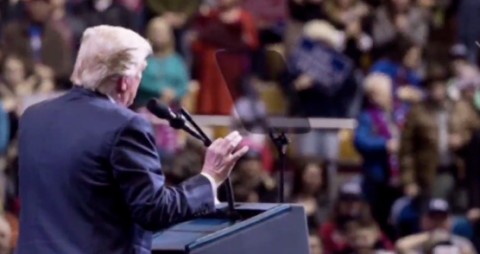Christians can’t confront violence by blaming “both sides” and their incivility
We don't have to choose a political party. We do have to name the problem for what it is.

By all rights, the arrest of a suspect in a week-long bomb campaign against leaders of the Democratic party, media figures, and the liberal philanthropic icon George Soros should have put to rest a news cycle of terror. It did not. On Friday night, the same day what appeared to be one of his supporters was arrested in connection with the bombing case, President Trump gave another fiery rally speech, including attacking "globalists"—a term freighted with an anti-Semitic history—and laughing as the crowd chanted for Soros to be "locked up." The next morning, a far-right gunman attacked a synagogue in Pittsburgh, killing 11 and wounding six more, including four police officers.
Real talk about American social divisions is needed more than ever, particularly in the church. It has long been a staple of religious leaders—particularly since Trump first emerged as a candidate in 2015—to decry the partisanship, incivility, and divisiveness that now seem like permanent fixtures of the national political climate. Christians are urged to come together in a spirit of unity to repair the breach that afflicts the body politic. Their leaders call them, rightly, to participate in the great ministry of reconciliation established in the body and blood of Jesus himself. The question lingers in the air: if Christians won’t do the work to improve political discourse to bring opposing sides together, who will? We are, after all, supposed to be the people of speaking the truth in love.
As positive as these calls are, however, their effectiveness is blunted by a lack of clear thinking about the problems set before us.
There is a natural tendency among religious leaders who answer to communities that are diverse or even divided among themselves to fudge the situation by denouncing overheated rhetoric on both sides of the political equation. If everyone would just settle down and be nice to one another, the implied message runs, things would be better.
But the problem isn’t incivility, and it isn’t “both sides,” as the journalist Dave Niewert documents at some length. It needs to be named for what it is: asymmetrical, state-sponsored calls to violence, and now responses to those calls.
However mean-spirited liberal rhetoric has been in recent years, there is only one party in the nation headed by a sitting president who spends an inordinate amount of time vilifying his political opponents and the media he terms an “enemy of the people,” and issuing subtle and not-so-subtle threats against them. And there is only one side of the political equation headed by that same sitting president who can’t quite bring himself to denounce neo-Nazi thugs who riot in the streets or brutal dictators who murder critical journalists. Not coincidentally, the people who have received pipe bombs in the mail are not the friends and allies of that sitting president. The creepy-crawlies of the American political underbelly respond to cues from the top, and at the moment, the signal they’re getting—despite any disavowals of “lone wolves”—is that it’s party time. Until Christians can recognize the problem for what it is, their response will be positive, nonpartisan, and ignored.
That's not to say churches have to choose one political party over the other. It is to say that Christians might have to confront wrongdoers directly and exclusively. To mangle scriptural metaphors, Christians might have to drop some "thou art the man" on the president and his enablers without offering a "both sides" fig leaf. It might also mean confronting other Christians who have allowed their faith to become a wholly-owned subsidiary of a party that has a harder and harder time rejecting misogyny, racism, and xenophobia.
On a deeper level, Christians need to stop mistaking symptoms for the disease. Urging people to be more civil to one another won't cure political divisions any more than dosing on Nyquil will cure a cold. Incivility, partisan rancor, at the extreme end terror and violence—these are all manifestations of an underlying problem. America is a divided house, sliced up into neat little non-interacting pieces by gerrymandering, social self-sorting, and closed epistemic loops created by partisan media sources (again, an asymmetrical problem). Until Americans learn to work together, play together, live together, and yes, worship together, this division isn't going to get any better.
Accomplishing all of that will require addressing race, class, geography, the arrangement of power, and the dysfunction of corporate media, all in the headwinds of a factionalism that demands its opponents be jailed. And that's before we get to the hard part: undoing those same social divisions in the pews of America's churches. It is a monumental project fraught with the potential for disaster, a project no leader in her right mind would undertake.
Fortunately, we're not in our right minds. We're Christians. We should get down to work.




